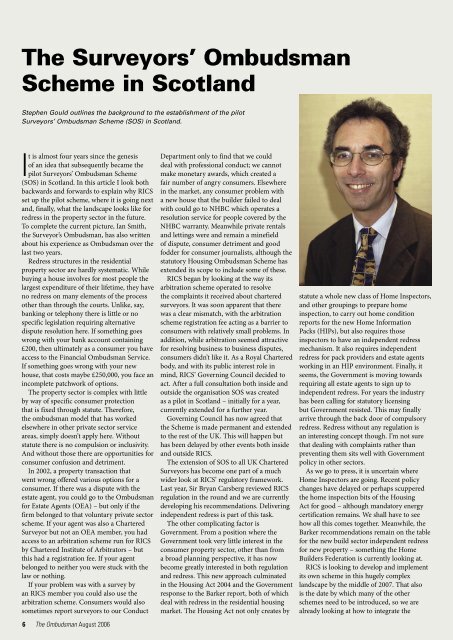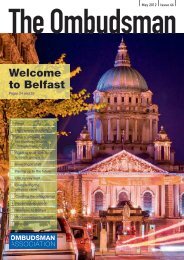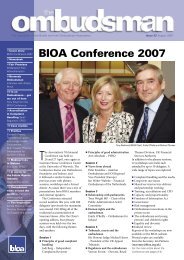29 Ombudsman.indd - British and Irish Ombudsman Association
29 Ombudsman.indd - British and Irish Ombudsman Association
29 Ombudsman.indd - British and Irish Ombudsman Association
Create successful ePaper yourself
Turn your PDF publications into a flip-book with our unique Google optimized e-Paper software.
The Surveyors’ <strong>Ombudsman</strong><br />
Scheme in Scotl<strong>and</strong><br />
Stephen Gould outlines the background to the establishment of the pilot<br />
Surveyors’ <strong>Ombudsman</strong> Scheme (SOS) in Scotl<strong>and</strong>.<br />
It is almost four years since the genesis<br />
of an idea that subsequently became the<br />
pilot Surveyors’ <strong>Ombudsman</strong> Scheme<br />
(SOS) in Scotl<strong>and</strong>. In this article I look both<br />
backwards <strong>and</strong> forwards to explain why RICS<br />
set up the pilot scheme, where it is going next<br />
<strong>and</strong>, finally, what the l<strong>and</strong>scape looks like for<br />
redress in the property sector in the future.<br />
To complete the current picture, Ian Smith,<br />
the Surveyor’s <strong>Ombudsman</strong>, has also written<br />
about his experience as <strong>Ombudsman</strong> over the<br />
last two years.<br />
Redress structures in the residential<br />
property sector are hardly systematic. While<br />
buying a house involves for most people the<br />
largest expenditure of their lifetime, they have<br />
no redress on many elements of the process<br />
other than through the courts. Unlike, say,<br />
banking or telephony there is little or no<br />
specific legislation requiring alternative<br />
dispute resolution here. If something goes<br />
wrong with your bank account containing<br />
£200, then ultimately as a consumer you have<br />
access to the Financial <strong>Ombudsman</strong> Service.<br />
If something goes wrong with your new<br />
house, that costs maybe £250,000, you face an<br />
incomplete patchwork of options.<br />
The property sector is complex with little<br />
by way of specific consumer protection<br />
that is fixed through statute. Therefore,<br />
the ombudsman model that has worked<br />
elsewhere in other private sector service<br />
areas, simply doesn’t apply here. Without<br />
statute there is no compulsion or inclusivity.<br />
And without those there are opportunities for<br />
consumer confusion <strong>and</strong> detriment.<br />
In 2002, a property transaction that<br />
went wrong offered various options for a<br />
consumer. If there was a dispute with the<br />
estate agent, you could go to the <strong>Ombudsman</strong><br />
for Estate Agents (OEA) – but only if the<br />
firm belonged to that voluntary private sector<br />
scheme. If your agent was also a Chartered<br />
Surveyor but not an OEA member, you had<br />
access to an arbitration scheme run for RICS<br />
by Chartered Institute of Arbitrators – but<br />
this had a registration fee. If your agent<br />
belonged to neither you were stuck with the<br />
law or nothing.<br />
If your problem was with a survey by<br />
an RICS member you could also use the<br />
arbitration scheme. Consumers would also<br />
sometimes report surveyors to our Conduct<br />
6 The <strong>Ombudsman</strong> August 2006<br />
Department only to find that we could<br />
deal with professional conduct; we cannot<br />
make monetary awards, which created a<br />
fair number of angry consumers. Elsewhere<br />
in the market, any consumer problem with<br />
a new house that the builder failed to deal<br />
with could go to NHBC which operates a<br />
resolution service for people covered by the<br />
NHBC warranty. Meanwhile private rentals<br />
<strong>and</strong> lettings were <strong>and</strong> remain a minefield<br />
of dispute, consumer detriment <strong>and</strong> good<br />
fodder for consumer journalists, although the<br />
statutory Housing <strong>Ombudsman</strong> Scheme has<br />
extended its scope to include some of these.<br />
RICS began by looking at the way its<br />
arbitration scheme operated to resolve<br />
the complaints it received about chartered<br />
surveyors. It was soon apparent that there<br />
was a clear mismatch, with the arbitration<br />
scheme registration fee acting as a barrier to<br />
consumers with relatively small problems. In<br />
addition, while arbitration seemed attractive<br />
for resolving business to business disputes,<br />
consumers didn’t like it. As a Royal Chartered<br />
body, <strong>and</strong> with its public interest role in<br />
mind, RICS’ Governing Council decided to<br />
act. After a full consultation both inside <strong>and</strong><br />
outside the organisation SOS was created<br />
as a pilot in Scotl<strong>and</strong> – initially for a year,<br />
currently extended for a further year.<br />
Governing Council has now agreed that<br />
the Scheme is made permanent <strong>and</strong> extended<br />
to the rest of the UK. This will happen but<br />
has been delayed by other events both inside<br />
<strong>and</strong> outside RICS.<br />
The extension of SOS to all UK Chartered<br />
Surveyors has become one part of a much<br />
wider look at RICS’ regulatory framework.<br />
Last year, Sir Bryan Carsberg reviewed RICS<br />
regulation in the round <strong>and</strong> we are currently<br />
developing his recommendations. Delivering<br />
independent redress is part of this task.<br />
The other complicating factor is<br />
Government. From a position where the<br />
Government took very little interest in the<br />
consumer property sector, other than from<br />
a broad planning perspective, it has now<br />
become greatly interested in both regulation<br />
<strong>and</strong> redress. This new approach culminated<br />
in the Housing Act 2004 <strong>and</strong> the Government<br />
response to the Barker report, both of which<br />
deal with redress in the residential housing<br />
market. The Housing Act not only creates by<br />
statute a whole new class of Home Inspectors,<br />
<strong>and</strong> other groupings to prepare home<br />
inspection, to carry out home condition<br />
reports for the new Home Information<br />
Packs (HIPs), but also requires those<br />
inspectors to have an independent redress<br />
mechanism. It also requires independent<br />
redress for pack providers <strong>and</strong> estate agents<br />
working in an HIP environment. Finally, it<br />
seems, the Government is moving towards<br />
requiring all estate agents to sign up to<br />
independent redress. For years the industry<br />
has been calling for statutory licensing<br />
but Government resisted. This may finally<br />
arrive through the back door of compulsory<br />
redress. Redress without any regulation is<br />
an interesting concept though. I’m not sure<br />
that dealing with complaints rather than<br />
preventing them sits well with Government<br />
policy in other sectors.<br />
As we go to press, it is uncertain where<br />
Home Inspectors are going. Recent policy<br />
changes have delayed or perhaps scuppered<br />
the home inspection bits of the Housing<br />
Act for good – although m<strong>and</strong>atory energy<br />
certification remains. We shall have to see<br />
how all this comes together. Meanwhile, the<br />
Barker recommendations remain on the table<br />
for the new build sector independent redress<br />
for new property – something the Home<br />
Builders Federation is currently looking at.<br />
RICS is looking to develop <strong>and</strong> implement<br />
its own scheme in this hugely complex<br />
l<strong>and</strong>scape by the middle of 2007. That also<br />
is the date by which many of the other<br />
schemes need to be introduced, so we are<br />
already looking at how to integrate the





